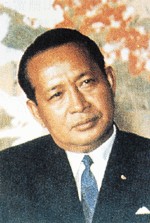1) the Suharto Era


苏哈托时期
1.
On The Indonesia's Open Economy Policy during the Suharto Era


略论苏哈托时期印尼的开放型经济政策
2) Post-Soeharto Era


后苏哈托时代
1.
A Study on the Indonesian Chinese Association and the Building of a "Diversity in Unity" Indonesia in Post-Soeharto Era
试论后苏哈托时代印尼华人社团与印尼多元和谐社会的构建
2.
Analysis on the Changes of Indonesia's Foreign Policy to China in Post-Soeharto Era


试析后苏哈托时代印尼对华政策的变化
3) Suharto


苏哈托
1.
Change in the Relations between Suharto and the Army;


论苏哈托与军队关系的变化
2.
On May 21,1998, Suharto, the President of Indonesia, who had been controlled Indonesia about 32 years, announced that he would resign the president position.
1998年5月21日,统治印尼长达32年的军方强人苏哈托宣布辞职,结束了对印尼的威权统治,启动了印尼的民主化进程。
4) Soviet Period


苏联时期
1.
An Investigation into the Influence Factor of the Ending of Marxist Philosophy in the Soviet Period;
苏联时期影响马克思主义哲学发展的因素探析
2.
The paper first introduces the influence of the developing activities on the water quantity and quality,and then analyzes the environmental and social economic effect brought by the change of the hydrological condition in this basin during the Soviet period.
介绍了苏联时期哈萨克斯坦在该流域内的开发活动对巴尔喀什湖水量、水质的影响,分析了该湖水文状况的变化所产生的生态环境效应与社会经济效应。
5) Soviet Russia


苏俄时期
1.
Intervention Foreign Policy of Britain in Central Asia and Influence During Soviet Russia;
苏俄时期英国对中亚的干涉外交及其影响
6) the period of the Soviet Areas


苏区时期
1.
The purpose of this article is to examine and reconsider Mao Tse dong s democratic thoughts and practice during the period of the Soviet Areas.
苏区时期 ,毛泽东为党的民主理论和民主事业做出了开拓性的贡献。
补充资料:苏哈托
| 苏哈托(1921~ ) Suharto 印度尼西亚总统(1968~ )。中学毕业后一度在银行当职员。后参加荷兰殖民军队。1942年日本人征服印度尼西亚后,加入日本人扶植的保卫团,接受军官的训练。日本投降后参加游击队,为争取印度尼西亚从荷兰人手中独立作战。1950年印度尼西亚成为共和国时为陆军中校。后升任陆军少将和印度尼西亚陆军战略后备司令。1966年3月12日苏哈托接管印度尼西亚政府,虽然苏加诺依然当了一年名义总统。1967年3月协商会议任命苏哈托为代理总统。1968年3月正式就任总统。1973、1978、1983、1988、1993年连任。1998年3月10日,在人民协商会议的投票中 ,他作为唯一的候选人以全票通过再次当选总统。执政以来,奉行独立自主和积极的外交政策,对内主张稳定局势,注重经济建设,任用专家,使经济获得长足进步,提高了印度尼西亚的国力和国际地位。1992~1995年当选为不结盟运动主席 ,主张加强南南合作和南北对话 。1990 年 11月曾访问中国 。著有《我的思想、言论和行动》。
|
说明:补充资料仅用于学习参考,请勿用于其它任何用途。
参考词条
